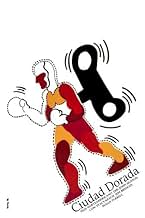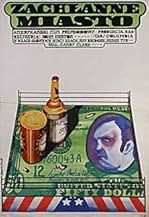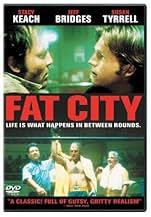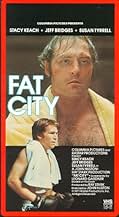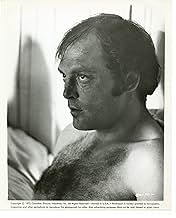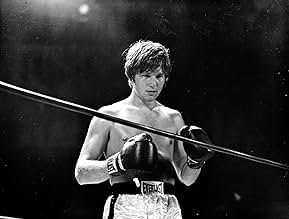NOTE IMDb
7,2/10
11 k
MA NOTE
Deux hommes qui travaillent comme boxeurs professionnels en viennent aux mains lorsque leurs carrières respectives prennent des tours différents.Deux hommes qui travaillent comme boxeurs professionnels en viennent aux mains lorsque leurs carrières respectives prennent des tours différents.Deux hommes qui travaillent comme boxeurs professionnels en viennent aux mains lorsque leurs carrières respectives prennent des tours différents.
- Nommé pour 1 Oscar
- 4 victoires et 4 nominations au total
Álvaro López
- Rosales
- (non crédité)
Carl D. Parker
- Paymaster
- (non crédité)
Bill Riddle
- Boxer
- (non crédité)
Al Silvani
- Referee at Tully-Lucero Fight
- (non crédité)
Avis à la une
American audiences don't generally go in for realistic stories of human despair and suffering that offer very little in the way of hope or relief. This may explain why John Huston's Fat City has been condemned to obscurity, a real shame considering what a great flick it is. It's the sort of movie you see and remember but can't quite pick it out of a line-up... a shuffling, mumbling story of down-and-out pugs in an off-the-map burgh. You're taunted with the possibilities of the story picking up to... well if not epic at least noteworthy proportions... but, all of the characters' minor victories are mitigated by their simultaneous defeats. Keach's Tully is the main thrust of the story, though it tends to veer off on the occasional tangent. A has-been who possibly never really was, crushed by the departure of his wife and overwhelmed by the constant little defeats in his life. Huston really drives this point home, that all of these little defeats add up. Without giving too much away, suffice to say Fat City is a film where mood overshadows plot. The mood is indelibly rendered by Conrad Hall's dark, dirty images, which nearly swallow the characters in the depth of their shadows. Watching it back to back with fellow pugilist opus Raging Bull (1980), it's easy to see that Huston was a keen observer of human behaviour, while Scorsese was a keen observer of Hollywood films of the thirties. And don't even talk about Rocky. I would compare it favourably with Barbet Schroeder's Barfly (1987), another film about fringe life in California, and even Vincent Gallo's excellent Buffalo '66 (1998), though of the three it is the bleakest and the least accessible.
John Huston's 1972 production of FAT CITY is a masterpiece of film-making and acting. It's more than just a movie of boxing, it's symbolic of the American Dream gone depressingly wrong. Stacy Keach in the finest role of his outstanding career is symbolic of "every-man". His dreams are based on professional successes, which by gaining money and fame, he will be happy in his life. As we know in so many cases, that obtaining fame and money leads many people down an even deeper road of depression and self-destruction. For without emotional success, without love, a person is empty inside. A powerful film. Not a boxing film at all. Boxing is merely the symbolism here; fighting to succeed. "I win the fight and I get my wife back", says Keach's character, Billy Tully.
A great movie, but one that leaves you feeling sad; pondering your own hopes, dreams, and desires. A remarkable supporting cast, high-lighted by a young Jeff Bridges, make FAT CITY one of John Huston's most memorable films. A Champion of movie-making.
A great movie, but one that leaves you feeling sad; pondering your own hopes, dreams, and desires. A remarkable supporting cast, high-lighted by a young Jeff Bridges, make FAT CITY one of John Huston's most memorable films. A Champion of movie-making.
Huston always had an eye for characters. His movies almost all dealt with the concerns of lower middle class working joes, the "regular fellows" with whom Huston somehow identified in the romantic Hemingwayesque lantern jawed "a man's gotta do what a man's gotta do" tradition. But his characters were more than mere macho he-men. They displayed genuine and uncommonly powerful vulnerabilities, hopes and dreams, flaws and finally cynicism. After an incredible first 20-plus creative years, Huston floundered for almost a decade with commercial and artistic disappointments (FREUD, THE BIBLE, THE KREMLIN LETTER, SINFUL DAVEY among them) before coming back to his wheelhouse with the carefully subdued yet deeply affecting character study FAT CITY.
FAT CITY is a grand return to form for Huston precisely because it is so indelibly imbued with real life in the form of its unforgettably true characters. None of these people are particularly remarkable individuals (frankly they are mostly below average in self-awareness, skills and intelligence), yet because Huston is so skillful at revealing character through the carefully structured unfolding (and gradual unhinging) of Keach's character, we are given insights which Keach (and Bridges and Candy Clark and the wonderful Nicholas Colasanto) can't make for themselves because they are too close to their own situations. Bridges has a nice interlude and Colasanto is so good in his limited Burgess Meredith Mickeyesque role, but the heart of this movie is Stacy Keach, who rises to the occasion with uncommon subtlety and power. It is a rare movie that can document losers in their daily lives without editorializing or sermonizing. FAT CITY takes an unflinching glance at these people and shows us things which seem prosaic on the surface but which upon examination hide deeper meaning (and heartbreak).
There are no pyrotechnics, no real twists, no witty or stand out dialogue exchanges, not much going on with the camera (though Hall's coloring is as always very well chosen), and very little budget on display in FAT CITY. It appears Huston shot pretty much everything on location in the flophouses around Stockton, CA. Yet the performances are uniformly outstanding and we come to care about these losers as they fumpher through life kidding themselves about where they've been, where they are and where they are going. I can't think of a movie where less actually happens to the characters (maybe BARFLY) but where I still find myself so deeply involved. Whenever I see it playing on the tube I generally stay with it all the way. There are very few movies in that league for me.
Warning: do NOT go in expecting crowd-pleasing Rocky-esque boxing sequences. This is less the story of a Rocky and more the story of a Spider Rico (the "ham n' egger" Rocky beats up in his first fight and from whom we never hear again.) The movie disguises itself as a Horato Alger-like comeback or underdog story initially, but it is ultimately one of the bleakest, realest character studies you're ever likely to see. One of the best Huston movies to come after the 1960s and a downbeat classic. 9/10.
FAT CITY is a grand return to form for Huston precisely because it is so indelibly imbued with real life in the form of its unforgettably true characters. None of these people are particularly remarkable individuals (frankly they are mostly below average in self-awareness, skills and intelligence), yet because Huston is so skillful at revealing character through the carefully structured unfolding (and gradual unhinging) of Keach's character, we are given insights which Keach (and Bridges and Candy Clark and the wonderful Nicholas Colasanto) can't make for themselves because they are too close to their own situations. Bridges has a nice interlude and Colasanto is so good in his limited Burgess Meredith Mickeyesque role, but the heart of this movie is Stacy Keach, who rises to the occasion with uncommon subtlety and power. It is a rare movie that can document losers in their daily lives without editorializing or sermonizing. FAT CITY takes an unflinching glance at these people and shows us things which seem prosaic on the surface but which upon examination hide deeper meaning (and heartbreak).
There are no pyrotechnics, no real twists, no witty or stand out dialogue exchanges, not much going on with the camera (though Hall's coloring is as always very well chosen), and very little budget on display in FAT CITY. It appears Huston shot pretty much everything on location in the flophouses around Stockton, CA. Yet the performances are uniformly outstanding and we come to care about these losers as they fumpher through life kidding themselves about where they've been, where they are and where they are going. I can't think of a movie where less actually happens to the characters (maybe BARFLY) but where I still find myself so deeply involved. Whenever I see it playing on the tube I generally stay with it all the way. There are very few movies in that league for me.
Warning: do NOT go in expecting crowd-pleasing Rocky-esque boxing sequences. This is less the story of a Rocky and more the story of a Spider Rico (the "ham n' egger" Rocky beats up in his first fight and from whom we never hear again.) The movie disguises itself as a Horato Alger-like comeback or underdog story initially, but it is ultimately one of the bleakest, realest character studies you're ever likely to see. One of the best Huston movies to come after the 1960s and a downbeat classic. 9/10.
The 1970s produced some of the greatest American movies of all time, that's indisputable. But while everyone focuses on (the admittedly very good) more famous works by Scorsese and Coppola, many equally worthwhile movies get little attention - 'Bring Me The Head Of Alfredo Garcia', 'Scarecrow', 'Fingers', 'Tracks', 'The Panic In Needle Park', 'Blue Collar', and this one, arguably John Huston's most underrated film. The four leads Stacey Keach ('The Ninth Configuration'), Jeff Bridges ('The Last Picture Show'), Susan Tyrrell ('The Killer Inside Me'), and Candy Clark ('American Graffiti') are all outstanding, and in Keach's case it's possibly his finest performance to date. What an underrated actor Keach is! This is a powerful and haunting look at the underbelly of American working class life, a subject very rarely dealt with honestly in contemporary Hollywood films. 'Fat City' doesn't deserve its obscurity. It is a small masterpiece. Highly recommended to people who value downbeat and realist dramas more than dumbed down popcorn "entertainment".
Fat City is a small film directed on location in Stockton, California by legendary director John Huston.
It is about small time boxers and small time losers. Stacy Keach is a washed up boxer, a drunk, making a comeback but really not up to it. He is in a tempestuous relationship with Susan Tyrell who is magnificent as his drunk girlfriend. The booze oozes out of her pores and she really cracks that paralytic look in her face.
Jeff Bridges is the up and coming boxer but he immediately loses his early fights, he gets his pretty girlfriend, Candy Clark pregnant and gets some irregular work as a labourer sometimes working with Keach in the fields.
There is nothing grandiose or bombastic about Fat City. It really is introverted dealing with the underclass in the early 1970s. The location filming adds a lot of authenticity and rawness.
Keach who was a noted Shakespearean actor of the American stage is very believable. He plays not a has been but a never was, who wants to have that one final crack of something big but he will get nowhere it as he always gets sidetracked, usually by booze.
Bridges at the time was the young up and comer with a mixture of enthusiasm and wide eyed innocence. He was 23 years old when he made this film and was already a veteran with an Oscar nomination to his name as he was a child actor working in his father's show.
A critic pointed out something novel about this boxing film. These almost desperate people we meet go out of their way to be kind to each other no matter how hopeless their situation.
When Keach argues with Tyrell you expect that he will hit her. When her ex-boyfriend turns up, you again expect that he will get in a fight with Keach. However you find people struggling to be nice and civil to each other.
Boxing actually plays a small part in the film. Fat City is a forgotten gem of 1970s cinema.
It is about small time boxers and small time losers. Stacy Keach is a washed up boxer, a drunk, making a comeback but really not up to it. He is in a tempestuous relationship with Susan Tyrell who is magnificent as his drunk girlfriend. The booze oozes out of her pores and she really cracks that paralytic look in her face.
Jeff Bridges is the up and coming boxer but he immediately loses his early fights, he gets his pretty girlfriend, Candy Clark pregnant and gets some irregular work as a labourer sometimes working with Keach in the fields.
There is nothing grandiose or bombastic about Fat City. It really is introverted dealing with the underclass in the early 1970s. The location filming adds a lot of authenticity and rawness.
Keach who was a noted Shakespearean actor of the American stage is very believable. He plays not a has been but a never was, who wants to have that one final crack of something big but he will get nowhere it as he always gets sidetracked, usually by booze.
Bridges at the time was the young up and comer with a mixture of enthusiasm and wide eyed innocence. He was 23 years old when he made this film and was already a veteran with an Oscar nomination to his name as he was a child actor working in his father's show.
A critic pointed out something novel about this boxing film. These almost desperate people we meet go out of their way to be kind to each other no matter how hopeless their situation.
When Keach argues with Tyrell you expect that he will hit her. When her ex-boyfriend turns up, you again expect that he will get in a fight with Keach. However you find people struggling to be nice and civil to each other.
Boxing actually plays a small part in the film. Fat City is a forgotten gem of 1970s cinema.
Le saviez-vous
- AnecdotesAccording to Stacy Keach, Sixto Rodriguez knocked him out during their fight scene and that shot appears in the film.
- GaffesDuring the bar scene, the barrette in Susan Tyrrell's hair moves all over the place from shot to shot.
- ConnexionsFeatured in Moviedrome: Fat City (1988)
- Bandes originalesHelp Me Make It Through the Night
Composed by Kris Kristofferson
Performed by Kris Kristofferson
© 1970 Combine Music Corporation
[Played over opening credits]
Meilleurs choix
Connectez-vous pour évaluer et suivre la liste de favoris afin de recevoir des recommandations personnalisées
- How long is Fat City?Alimenté par Alexa
Détails
- Date de sortie
- Pays d’origine
- Langues
- Aussi connu sous le nom de
- La dernière chance
- Lieux de tournage
- Sociétés de production
- Voir plus de crédits d'entreprise sur IMDbPro
Contribuer à cette page
Suggérer une modification ou ajouter du contenu manquant


